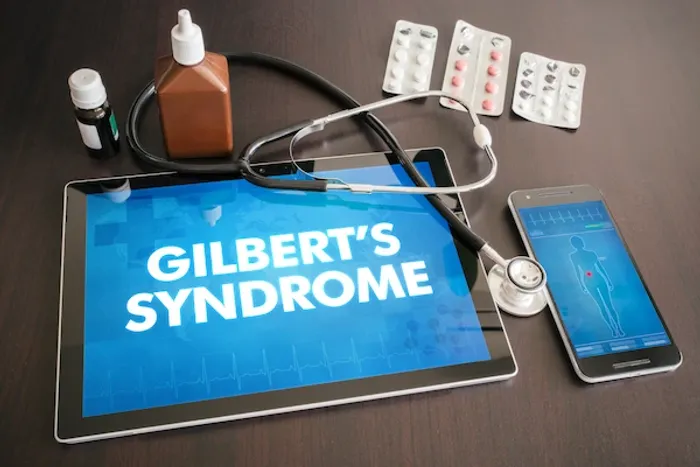Understanding Gilbert's Syndrome and Its Aspects
Know about Gilbert’s syndrome, what it is, causes, risks, and symptoms. Learn about the diagnosis and management of Gilbert’s syndrome.


Introduction
Gilbert's Syndrome is a common, harmless liver condition that affects the way your body processes bilirubin—a yellow pigment produced when old red blood cells break down. While it may sound concerning, Gilbert's Syndrome is usually a mild condition that doesn’t require treatment. However, understanding it can help you manage any symptoms and live a worry-free life.
This article will help you understand the most critical things about Gilbert’s syndrome.
What is Gilbert's Syndrome?
Gilbert's Syndrome is a genetic disorder where the liver doesn’t process bilirubin efficiently. Bilirubin is a waste product formed when red blood cells break down. Normally, the liver converts bilirubin into a form that can be excreted in bile (a digestive fluid).
In people with Gilbert's Syndrome, this process is slower, leading to a mild increase in bilirubin levels in the blood.
This condition is usually inherited and is present from birth, but symptoms may not appear until adolescence or adulthood. It is more common in men than in women.
Consult a Liver Specialist for Personalised Advice
Symptoms of Gilbert's Syndrome
Many people with Gilbert's Syndrome have no symptoms at all. However, some may experience:
- Mild jaundice (yellowing of the skin and eyes) – This occurs when bilirubin levels rise slightly.
- Fatigue or weakness – Some individuals feel tired, especially during stress or illness.
- Occasional abdominal discomfort – A mild, vague discomfort in the abdomen may occur.
These symptoms can be triggered by:
- Dehydration
- Fasting or skipping meals
- Stress or anxiety
- Illness (like a cold or flu)
- Strenuous exercise
Causes and Risk Factors
Gilbert's Syndrome is caused by a genetic mutation in the UGT1A1 gene, which affects bilirubin processing. You inherit this condition from your parents.
Risk factors include:
- Family history – If a parent has Gilbert's Syndrome, you may inherit it.
- Gender – Men are more likely to develop noticeable symptoms.
- Age – Symptoms often appear in the late teens or early adulthood.
How Does Gilbert's Syndrome Affect Health?
Gilbert's Syndrome is not harmful and does not lead to serious liver disease. However, it can sometimes cause:
- Mild jaundice, which comes and goes.
- Misdiagnosis – Since bilirubin levels can fluctuate, doctors may suspect other liver conditions before confirming Gilbert's Syndrome.
- Medication sensitivity – Some drugs (like certain chemotherapy or HIV medications) may be processed differently, so always inform your doctor about your condition.
Diagnosis of Gilbert's Syndrome
If you have unexplained jaundice or elevated bilirubin levels, your doctor may perform:
- Blood tests – To check bilirubin levels (usually mildly elevated).
- Liver function tests (LFTs) – To rule out other liver diseases.
- Genetic testing – Rarely needed, but can confirm the UGT1A1 gene mutation.
Since Gilbert's Syndrome doesn’t cause liver damage, imaging tests (like ultrasounds) are usually unnecessary.
Managing Gilbert's Syndrome
Since Gilbert's Syndrome is a lifelong condition, the focus is on managing symptoms rather than curing it. Here are some helpful tips:
1. Stay Hydrated
Dehydration can worsen bilirubin buildup. Drink plenty of water throughout the day.
2. Eat Regularly
Skipping meals can trigger symptoms. Eat small, frequent meals to keep your liver functioning smoothly.
3. Manage Stress
Stress can increase bilirubin levels. Practice relaxation techniques like yoga, meditation, or deep breathing.
4. Avoid Extreme Fasting or Crash Diets
Prolonged fasting can raise bilirubin levels. If you're planning a diet, consult a doctor first.
5. Limit Alcohol
Alcohol can strain the liver. Moderate consumption is okay, but excessive drinking may worsen symptoms.
6. Inform Your Doctor About Medications
Some drugs (like acetaminophen in high doses or certain antibiotics) may affect bilirubin levels. Always inform your doctor about your condition before taking new medications.
When to See a Doctor?
Gilbert's Syndrome doesn’t usually require medical treatment. However, consult a doctor if:
- Jaundice becomes severe or persistent.
- You experience unexplained weight loss, dark urine, or severe abdominal pain (to rule out other liver conditions).
- You’re prescribed new medications and want to ensure they’re safe.
Final Thoughts
Gilbert's Syndrome is a benign condition that rarely causes serious problems. While it may lead to occasional jaundice or fatigue, simple lifestyle adjustments can help manage symptoms effectively. If you’ve been diagnosed, there’s no need to worry; just stay hydrated, eat well, and keep stress in check.
Consult a Liver Specialist for Personalised Advice
Consult a Liver Specialist for Personalised Advice

Dr. Swapnil Mujawdiya
Gastroenterology/gi Medicine Specialist
7 Years • MBBS, MD (Medicine), DM, Gastroenterology, SGPGI (Lucknow).
Indore
Apollo Hospitals Vijay Nagar, Indore

Dr Shankar Roy
Gastroenterology/gi Medicine Specialist
15 Years • DM Gastroenterology (July 2022 to June 2025): PGIMER, Chandigarh, India MD General Medicine (2018 to 2021): AIIMS Rishikesh, Uttarakhand, India MBBS (2011 to 2016): GMCH Guwahati, Assam India
Guwahati
Apollo Excelcare Hospital, Guwahati

Dr Pramod Kumar D A
Hepatologist
15 Years • MBBS,MD General Medicine, DM in Hepatology
Bengaluru
Apollo Hospitals Bannerghatta Road, Bengaluru

Dr Suresh Raghavaiah
Hepatologist
15 Years • MBBS, MS, FHPB (Paris), FASTS (Mayo Clinic, USA)
Bengaluru
Apollo Hospitals Bannerghatta Road, Bengaluru

Dr. Kumaragurubaran. S
Hepatologist
0 Years • MBBS.,MD.,FPIC.,DM.,
Tiruchirappalli
Apollo Speciality Hospitals Old Palpannai, Tiruchirappalli
(50+ Patients)
Consult a Liver Specialist for Personalised Advice

Dr. Swapnil Mujawdiya
Gastroenterology/gi Medicine Specialist
7 Years • MBBS, MD (Medicine), DM, Gastroenterology, SGPGI (Lucknow).
Indore
Apollo Hospitals Vijay Nagar, Indore

Dr Shankar Roy
Gastroenterology/gi Medicine Specialist
15 Years • DM Gastroenterology (July 2022 to June 2025): PGIMER, Chandigarh, India MD General Medicine (2018 to 2021): AIIMS Rishikesh, Uttarakhand, India MBBS (2011 to 2016): GMCH Guwahati, Assam India
Guwahati
Apollo Excelcare Hospital, Guwahati

Dr Pramod Kumar D A
Hepatologist
15 Years • MBBS,MD General Medicine, DM in Hepatology
Bengaluru
Apollo Hospitals Bannerghatta Road, Bengaluru

Dr Suresh Raghavaiah
Hepatologist
15 Years • MBBS, MS, FHPB (Paris), FASTS (Mayo Clinic, USA)
Bengaluru
Apollo Hospitals Bannerghatta Road, Bengaluru

Dr. Kumaragurubaran. S
Hepatologist
0 Years • MBBS.,MD.,FPIC.,DM.,
Tiruchirappalli
Apollo Speciality Hospitals Old Palpannai, Tiruchirappalli
(50+ Patients)